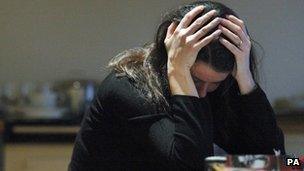Basic rights of mentally ill 'violated'
- Published

The basic rights of some mental health patients in England are being "violated" because of a shortage of beds in psychiatric units, MPs say.
The Health Select Committee said there was evidence some people are being sectioned unnecessarily to secure hospital treatment.
It also warned safeguards to protect patients who lack capacity are often ignored.
The charity Rethink said the findings were "shocking".
Changes to mental health laws in 2007 were supposed to ease pressure on psychiatric units by extending the treatment available out of hospital.
Legislation provided for Community Treatment Orders so some people previously detained in hospital could be treated - under supervision - in the community.
But compulsory detention has continued to increase.
The report said in 2008-09 there were 42,208 detentions in England. By 2011-12 the figure had risen to 44,894.
'Ticket to a bed'
Many wards are at over-capacity. The MPs were told it has become hard to be admitted voluntarily.
One witness said "being detained is the ticket to getting a bed".
Their report said compulsory detention when it was not clinically necessary would be a "serious violation" of civil rights.
It called for an urgent investigation by the Department of Health to establish the prevalence of the practice.
The inquiry also examined safeguards to protect people detained under the Mental Capacity Act. These are often patients in care homes with dementia or severe learning difficulties.
The safeguards include provisions to provide a representative, to offer a right of challenge, and for a regular review of their deprivation of liberty.
The MPs concluded there was "extreme variation in their use" - a situation they describe as "profoundly depressing".
They called for an urgent review of Deprivation of Liberty Safeguards (DOLS) together with an action plan for improvement to be presented to Parliament within 12 months.
Paul Jenkins, from the charity Rethink, said: "It's absolutely shocking that people are being sectioned unnecessarily, just so they can get access to the treatment they are entitled to. Being sectioned, although sometimes necessary, can be extremely distressing and should only be used as a last resort.
"Treatment is much less likely to work if it is imposed on patients against their wishes. Health professionals should be aiming to build a trusting partnership with their patients and to take away their liberty unnecessarily like this, completely undermines that trust."
Dr Julie Chalmers, the Royal College of Psychiatrists' lead for mental health law, said: "We share the committee's concerns over the severe pressure on beds, and believe this is an issue that needs to be urgently addressed.
"However it is also important to ensure that there are a range of effective community services to support people who are in crisis before the need to consider hospital admission arises.
- Published18 June 2012